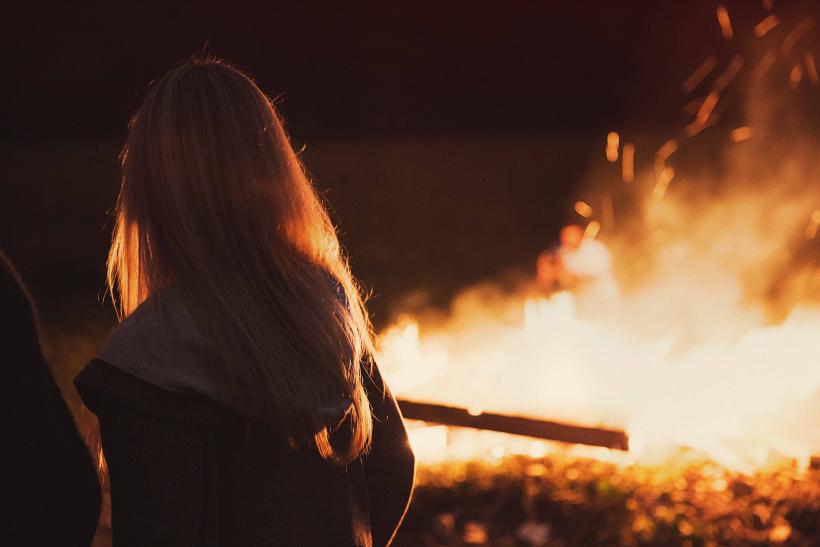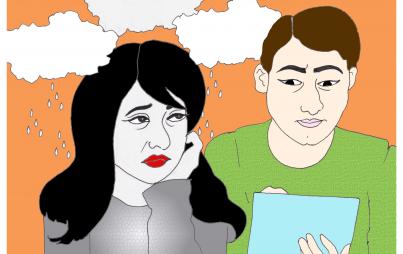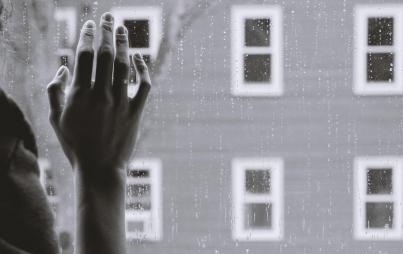
We believed that we were always just one prayer away from seeing the fire. The fire was everything we hoped and prayed for and prophesized; we believed it could start with us.
I am staring at my new cherry red Vans I got for my sixteenth birthday as the preacher flips through the tissue-thin pages of his Bible like he is about to start a lesson. This is my first youth group revival with the Pentecostal church in my small town, and though I’ve seen my share of altar calls with speaking in tongues and other rowdy charismatic displays, the preacher tonight is supposedly more anointed than anyone else alive in our times. For weeks at youth group meetings, we were instructed to prepare our hearts for the divine appointments the Lord may have for us during this revival. I hope my heart is prepared, but I am not sure.
The preacher suddenly shuts the Bible and closes his eyes. I wait along with a silent, expectant room. He reaches his hand out toward the crowd and mutters words too low for the microphone to pick up. Then he looks up and begins to speak.
"There is someone in this room, a young lady,” he is talking slowly and deliberating over every word in a low, raspy voice. “She is hiding something.”
He marinates in more silence for a good twenty seconds, as all of us teen girls shift uncomfortably in our seats.
As much as I dread being exposed, I long to be known. I long to be discovered.
“The Lord is telling me an evil spirit is twisting your thoughts . . . Satan has really gotten under your skin . . . I am getting a clearer picture now . . . The Lord is saying you have an eating disorder,” he says.
He pauses again and raises his hands. My eyes bulge. I have heard about how the Lord could give prophecies to people like this, but have never seen it before.
“If you are that girl, I’d like you to come forward,” he says.
A girl who looks no older than fourteen makes her way from her seat to the stage. I have never seen a girl with an eating disorder in real life before, at least not one that I knew about. She looked like a regular girl to me, not strikingly skinny or overweight.
The preacher flicks his wrist, and a few female youth leaders come forward. They all lay hands on the girl.
“We shake the power of evil that has caused this sickness in this young woman,” he says.
“Yes Lord,” several people in the crowd moan.
“We cut ties with Satan and free this young lady right now. We claim deliverance from demonic voices. In Jesus’s name, we claim wholeness right now,” the preacher says. “In Jesus’s name. In Jesus’s name. In Jesus’s name,” he continues.
His voice grows with intensity, and he begins screaming God’s name, and the crowd whistles and claps. The girl is sobbing and whacking her hands against her chest as the preacher prays. The women circling her rock her back and forth and then they push her to the ground, where she thrashes like a fish on a stringer. They cover her with a blanket and stroke her forehead as she cries.
“In Jesus’s name,” the preacher says one last time before opening his eyes and scanning the audience. “Whew, the Spirit is powerful. Releasing chains tonight. Healing people tonight."
This is the first miracle I’ve ever seen.
I stare at my lap. This kind of healing isn’t provable — I would like to see someone grow a limb or something — but I guess that’s me doubting the Holy Spirit again. I have to learn to have more faith.
I look up and see the preacher staring right at me. My heart starts beating fast, and I can feel sweat beads forming in my armpits. I lock eyes with him and let him read my face. I get this creepy feeling he is watching my whole life unfold in this one gaze, even my secret thoughts. I feel a scary tickle down my spine. As much as I dread being exposed, I long to be known. I long to be discovered. I wonder what he knows.
“The Spirit is telling me there is someone here who battles the Spirit of Insecurity,” the preacher says, not breaking eye contact with me. “I have a special word for you tonight if you come forward.”
I feel a tug at my heart, and I wonder if this is what people mean when they talk about being prompted by the Holy Spirit. I know this special word is for me and I need to receive it. But as much as I want to run to the stage and let the prayer ladies hold me as I cry, my muscles are locked. I can’t move.
We believed that we were always just one prayer away from seeing the fire. The fire was everything we hoped and prayed for and prophesized; we believed it could start with us.
This could be the night everything changes, the voice says, and I feel myself tearing up. Get up there. But my body is frozen.
As I waver, a girl from the back walks down the aisle. She is crying too. I half expect the preacher to stop her and tell her to get back to her seat because the special word was for the girl in the glasses in row three. But he doesn’t. He lays his hands on her shoulders and begins to prophesize over her passionately as I remain in my seat, crushed. Maybe he wasn’t looking at me after all.
Jealousy wells up inside me for the girl who went up instead of me. I watch her flowing, long brown hair swish around her back as the preacher prays for her. Her hair is like Courtney Cox’s, and mine is so thin I have to wrap a rubber band around it three times to make a ponytail stay. I guess you can have great hair and still be insecure. Or maybe she stole my prophecy.
“Spirit of Boldness, take this young woman tonight. Let her respond to the call to be possessed by God,” the preacher wails. “Let her burn like fire for You.”
I close my eyes and absorb every word of the prayer. Meanwhile, the girl healed of her eating disorder is passed out and motionless on the floor by the preacher’s feet. This is the last time I will miss out on something God has for me.
You Might Also Like: Not Your Grandmother’s Religion: Why My Parochial Education Was A Big Fail
I grew up in Pine Canyon — a northern California town tucked in the crevasses of the Sierra Nevada Mountains. By the time I was born in the 1980s, Pine Canyon had a population of about six hundred; its apex reached more than a hundred years before. Its bustling railroad-and-gold days long forgotten, Pine Canyon had tapered to families partial to quiet mountain life. On the outskirts of town, there was a church known as Pine Canyon Assemblies of God.
It’s hard to say why I started attending that Pentecostal church—and why I stayed throughout my teen years despite the abuse and crippling fundamentalist rules. My parents were nominal Christians and didn’t attend church regularly. Our home life was relatively normal. But I was lonely. A nerdy homeschooled girl with crooked glasses, I desperately wanted to be a part of something. And this felt like something big.
That night at my first revival marked the beginning of my radical faith. I learned to pray in tongues, and I began to spend hours a day in prayer. I lived at the altar, where I would press my face into the mildewed carpet at our little church to find deeper revelations from Jesus.
I believed I could change the world with the power of prayer.
I begged God for my generation to see a “revival” that would spread like fire through the rugged river canyon of our rural town.
We believed that we were always just one prayer away from seeing the fire. The fire was everything we hoped and prayed for and prophesized; we believed it could start with us.
When the fire did come, it wasn’t allegorical or spiritual. A propane spark at the river started a forest fire that spread up the canyon quickly, and it burned a thousand acres and my family’s lovingly built home — the one we spent ten years building, a room here and there, whenever we had the money. The one we finally had moved in a couple of years before, after living for a decade in a trailer.
Of course, I still believed in miracles. When the firefighters led us to the site where our home once stood, I had this magical notion that God had preserved my prayer journals. The journals would be sitting on a glowing gold pedestal, and the fire department wouldn’t be able to explain the miracle. But all I found was a couple of deformed marbles from my old collection. I kept them.
After this, I slumped into a clinical depression, although I didn’t know what to call it then. Ten days after the fire, I moved into the dorms at a Pentecostal college a few hours from home. Everyone said I should still go to college, so I did, or at least my body did. My mind was somewhere else. Suddenly, it was hard to believe in the miracles I used to pray for.
I was terrified of falling away from the faith I once believed in so strongly. And yet I couldn’t stop slipping.
On the night of the campus’s big prayer event, I force myself to throw on a sweatshirt and leave my dorm to attend. The chapel is packed. The speaker opens the floor to anyone who has a word to share, a common practice at Pentecostal prayer nights. I raise my hand. I walk forward to the front of the chapel stage, ready to deliver a prophecy for the hungry crowd. I feel more powerful with each step. I can do this.
I look out at my audience and see the desperation in their eyes. They are waiting for me to speak something into their lives, hoping I will say something they can cling to and believe in, something that will make them cry cathartic tears. I press the microphone to my lips and begin.
“I feel the Lord is pressing me to tell this room that no matter what we’ve been through, God has a plan for us,” I say.
The crowd cheers and I hear “amens” around the room.
“And I feel in this moment that God’s plan for us is to move mightily on campus this year,” I say. I close my eyes. “Mightily like the hand he used to defeat his enemies thousands of years ago,” I say.
More cheers. My hands are shaking.
“Yes Lord!” someone shouts from the back.
“Mightily like the force of a river, constant, rushing over us, carrying us despite our brokenness!” My teeth are clicking into the microphone, but I continue, “I hear the whispers from the Holy Spirit saying, ‘This is our season of restoration! God will bring beauty for ashes, strength for pain, gladness for mourning.’ Say it with me, Yes, Lord!”
“Yes, Lord!” the room chants back at me.
“This is our time, people! This is our time,” I say.
I stand in silence on stage, basking in the moment. People are cheering and crying and raising their hands in worship.
I hand the microphone to the speaker and step down. I walk down the aisle, to the back of the chapel, and outside. I walk past my dorm room and into the woods behind campus, where the only lights are the stars, and the only noise is a chorus of crickets. I sit down and lean against a redwood tree and shiver. Santa Cruz evenings are colder than I’d thought they’d be. I sit there, breathing in the chilly air and breathing out steam.
I listen to the crickets long enough that I begin to hear them chant: You’re a fraud. You’re a fraud. You’re a fraud.
I didn’t have a prophecy, not one bit. I made it all up. Why I did it, I can’t even say, but I think I wanted to hear people say “Amen” to something I said. I think I did it because I want to be loved. We were all frauds just looking for love. At this moment, I stop believing.
It took me some time after that night to leave. Even after I physically left, it took me years to process those fiery Jesus years. I spent many hours in therapy trying to undo the damage that fundamentalism brought to my mental health. I am still working through it.
For me, mental health and radical faith will never coexist. Radical faith is all about magical thinking, the black-and-white, histrionic displays of belief, and prescriptive answers. It worked for me for a time when I was desperate for love and belonging, but when real life hit, those answers didn’t cut it for me anymore. My faith floundered, and I blamed myself. If I were more pure or holy, then I’d see revival, and if I truly lived for God, I’d see miracles.
I couldn’t be depressed — depression was for people who don’t love Jesus.
The danger of this kind of mentality is obvious to those not indoctrinated. We were told that everything we need was in the Bible and that prayer was the answer to everything. Sad? Pray more. Heartbroken? Confess your sins. Anxious? Trust God. Not only do many faith circles cause or exacerbate mental health issues, but they also block people from getting the help they truly need.
My path to restoring mental health has been about relearning to trust my intuition (the one I learned to squelch in those first church services I attended) and to allow balance to flourish in the places extremity once ruled. I have worked to ground myself in my body — not the spiritual or the supernatural, but my own physical body. It has required me to let go of my anger toward the people from my past, starting with myself.
A few years ago, I took a trip to see the church that had such a profound impact on my life. I stepped out of my car, clutching a cup of black coffee from the local café. The potholes in the street had been patched up, and new ones had formed. Moss grew in the upturned chunks of sidewalk leading to the church entrance. It was a Friday morning, and the gravel parking lot was empty.
The sign on the marquee listed a new pastor. I had been hearing rumors that my old pastors retired a few years ago, but the sign made it real. I walked up to the door, jostled the locked knob and stepped back, feeling like a trespasser in the place I’d once called home.
The building was now white with green trim, but the painted stucco was peeling in round, blotchy spots to reveal the stone gray color I remembered. I peered through the rotting windowsill, but couldn’t see past the frosted glass. Several of the windows were broken, and cardboard had been taped to them from the inside.
I sat on the concrete ledge outside the front door where I used to idle around with my friends for hours after church: laughing, singing, unaware that the sheen of youth would ever wear off. Believing that revival was about to come. Trusting in the prophecies, holding out for miracles. There is a beauty to absolute faith too.
All those years I maintained this illusion that all these big things were happening here. That illusion was finally sinking, just like the roof on this old building.
I think we had to believe in the miracles because our day-to-day lives were so empty.
I felt a pang of pity for the people who would worship there in two days, thinking they are on the cusp of seeing God do something huge. It’s an exhausting way to live, and I don’t know how anyone can sustain it. I wondered if the reality of life would eventually erode their tenderly held beliefs like it did mine, or if their fear of loss will keep them clinging even tighter to their beliefs. It wasn’t too long ago that I was the one clinging out of fear.
I drove away from the church that day at peace. I’m not done unpacking the extent of what fundamentalism took from me, but for the most part, I am at peace.
I never did see the kind of revival I used to pray for. I don’t believe in revival anymore, except the kind that comes from within: old life ebbing away and churning and churning to make something new. This is the natural process of being alive. I no longer need to pray or cry or beg God or believe in anything magical to see revival.
My only job is to breathe deep and notice it. That is enough of a miracle for me.








